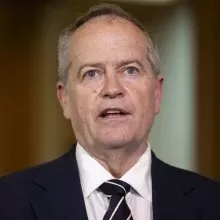
Federal and state governments may have to find $3.7 billion a year to support people with mild autism and less severe disabilities outside the NDIS, but Disability Minister Bill Shorten says he is confident his overhaul of the scheme will save taxpayers money.
Releasing the independent review into the $42 billion program on Thursday, Mr Shorten unveiled a new system of “foundational” supports for people whose disabilities were not severe enough to qualify for a radically revamped National Disability Insurance Scheme.
This includes people with mild forms of autism and developmental delay, who will no longer gain automatic access to the scheme when “access lists” of eligible medical diagnoses are axed within five years.
A surge in children with autism joining the NDIS has been one of the factors driving its rapid growth, and the program has doubled in cost over the past three years.
Martin Laverty, an inaugural director of the NDIS, said he estimated the foundational supports envisaged by the review would cost $3.7 billion a year in new money. Foundational supports will operate at schools, childcare centres and across the health system.
Dr Laverty, who now runs not-for-profit disability services provider Aruma, said the growth in childhood autism diagnoses in the past five years was directly attributable to the access lists, which included severe autism as a medical diagnosis that qualified for automatic entry.
Experts say the lists encouraged “doctor shopping”, where parents would explicitly seek out a medical professional who would diagnose their child with level two autism rather than level one autism, which is relatively mild and does not qualify for the NDIS.
“It’s unclear as to if prevalence of autism in our community has grown. But diagnosis has grown solely because eligibility required parents to secure a diagnosis because there was no alternative service option to families concerned for their kids,” Dr Laverty said.
Grattan Institute disability program director Sam Bennett said there was always an inconsistency between the access lists, which were based on a medical diagnosis, and the NDIS legislation, which instead focused on the significance of the impairment resulting from a disability.
“Anecdotally, it seems to be the case that there are now no level one [autism] diagnoses in Australia,” Dr Bennett said.
After Labor promised the states $25 billion in extra GST and hospital funding to get them to pay more for disability supports, Mr Shorten on Friday said he still thought the NDIS overhaul would save the taxpayer money.
“When you go to this second issue about if we’re going to help people with milder disabilities, do we really save any money? Yes, we do because frankly, the NDIS is an expensive solution,” he told Sky.
“It’s appropriate to be a very intensive individual package for people who are most seriously disabled. But you don’t necessarily need to use that for people with milder disabilities.”
Perverse incentive
Dr Laverty said the NDIS had unintentionally created a medical-only pathway for children with developmental delay and mild autism.
“For children with mild to moderate disability, they are in fact often better served outside clinical environments,” he said.
The lack of support outside the NDIS created a perverse incentive to seek out an autism diagnosis to join the scheme.
“When the NDIS was established, state territory governments were expected to continue to provide community-based access to interventions in playgroups, childcare centres and schools,” Dr Laverty said.
“When that dried up, the only option available to parents of kids with developmental delay was to seek a diagnosis in order to get entry into the NDIS.”
Dr Bennett said the decision to remove access lists was a “no-brainer”.
“The lists were only there to enable a quicker transition. They’re not required under the legislation, so removing them is easy,” he said.
“The difficult bit is that the review doesn’t say what they should be replaced with. It says we should have a standardised process of functional assessment but not what that should be.”
from https://www.afr.com/politics/ndis-reforms-may-throw-up-3-7b-in-new-autism-costs-20231208-p5eq56